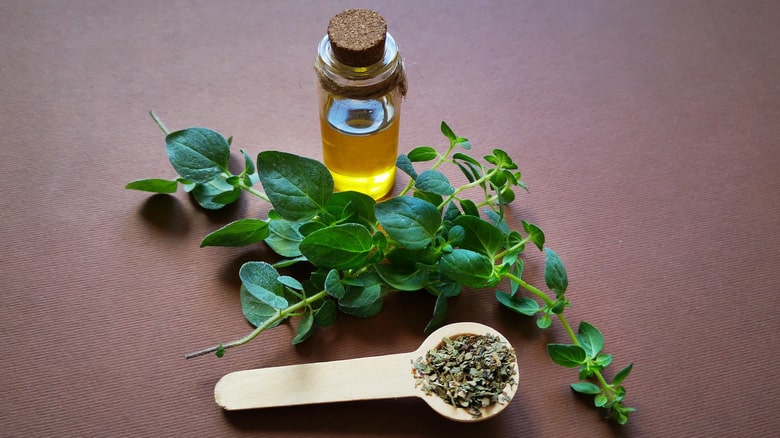Oil of oregano is a natural remedy that has gained popularity in recent years due to its potential health benefits. While it is commonly used for its antimicrobial properties, some breastfeeding mothers may wonder whether it is safe to take oil of oregano while nursing their baby.
Understanding the potential effects of oil of oregano on breastfeeding and the safety considerations involved can help mothers make informed decisions about their health and that of their infant.
While some studies suggest that oil of oregano may have benefits for certain conditions, such as candida infections, its use in breastfeeding requires caution and careful consideration.
Consulting a healthcare provider before using oil of oregano while breastfeeding is recommended, as they can provide guidance on safe and effective use, as well as potential risks and side effects. Mothers should also be aware of the quality and efficacy of the oil they are using, as well as any regulations or approvals that may apply.
Understanding Oregano Oil

Oregano is a popular herb that is commonly used in cooking. It is known for its strong flavor and aroma. Oregano oil is derived from the leaves of the oregano plant through steam distillation.
The oil contains several compounds, including carvacrol, thymol, eugenol, and rosmarinic acid.
Carvacrol is the most abundant compound found in oregano oil. It is known for its antimicrobial properties and has been shown to be effective against a wide range of bacteria, viruses, and fungi.
Thymol is another compound found in oregano oil that has antimicrobial properties.
Eugenol is a compound found in oregano oil that has anti-inflammatory and analgesic properties. It has been shown to be effective in reducing pain and inflammation.
Rosmarinic acid is another compound found in oregano oil that has anti-inflammatory properties.
Oregano oil is commonly used as a natural remedy for a variety of ailments, including colds, flu, and digestive issues. It is also used topically to treat skin infections, wounds, and acne.
However, it is important to note that oregano oil should not be used during pregnancy or while breastfeeding. There is limited research on the safety of oregano oil during pregnancy and breastfeeding, and it is not recommended for use during these times.
In conclusion, oregano oil contains several compounds that have antimicrobial, anti-inflammatory, and analgesic properties. It is commonly used as a natural remedy for a variety of ailments, but should not be used during pregnancy or while breastfeeding due to limited research on its safety during these times.
Breastfeeding and Diet
Breastfeeding mothers need to have a balanced and nutritious diet to ensure that their baby is getting all the necessary nutrients for proper growth and development. It is important to eat a variety of foods from all the food groups including fruits, vegetables, whole grains, lean proteins, and healthy fats.
Some mothers may choose to take dietary supplements to help support their milk supply and ensure they are getting all the necessary vitamins and minerals. However, it is important to consult with a healthcare provider before taking any supplements as some may not be safe for breastfeeding mothers.
One supplement that has gained popularity in recent years is oil of oregano. While there is limited research on the safety and effectiveness of oil of oregano during breastfeeding, some studies suggest that it may have antimicrobial properties and could potentially help with certain health conditions.
However, it is important to note that there is not enough evidence to support the use of oil of oregano as a treatment for any health condition.
It is also important to be cautious when using any essential oils during breastfeeding as they can be very potent and may have negative effects on both the mother and baby. It is recommended to consult with a healthcare provider before using any essential oils while breastfeeding.
In summary, a balanced and nutritious diet is essential for breastfeeding mothers to support their milk supply and provide their baby with all the necessary nutrients for proper growth and development.
While some supplements may be helpful, it is important to consult with a healthcare provider before taking any supplements or using any essential oils during breastfeeding.
Safety of Essential Oils in Breastfeeding

Essential oils are highly concentrated plant extracts that have been used for centuries for their therapeutic properties. While some essential oils are safe to use during pregnancy and breastfeeding, others can be harmful to the mother and the baby.
Therefore, it is important to exercise caution when using essential oils during breastfeeding.
The safety of essential oils during breastfeeding depends on several factors, including the type of oil, the method of application, and the dose. Some essential oils are safe to use in low doses, while others should be avoided altogether.
It is also important to note that the safety of essential oils during breastfeeding has not been extensively studied, and there is limited research on the topic.
The following table lists some essential oils that are generally recognized as safe to use during breastfeeding, as well as some oils that should be avoided:
| Safe to use | Avoid |
|---|---|
| Lavender | Peppermint |
| Chamomile | Sage |
| Frankincense | Oregano |
| Lemon | Thyme |
| Eucalyptus | Clove |
| Tea tree | Wintergreen |
When using essential oils during breastfeeding, it is important to follow these precautions:
- Always dilute the essential oil in a carrier oil before applying it to the skin.
- Avoid applying essential oils to the breasts or nipples.
- Use essential oils sparingly and in low doses.
- Consult a healthcare provider before using essential oils if you have any medical conditions or are taking any medications.
In conclusion, while some essential oils are safe to use during breastfeeding, it is important to exercise caution and follow the necessary precautions. It is also important to consult a healthcare provider before using essential oils during breastfeeding.
Potential Effects on Infants
Oil of oregano is a natural supplement that has been used for its medicinal properties for centuries. While it is generally considered safe for adults, there is limited research on the effects of oil of oregano on infants, particularly those who are breastfed.
Breastfeeding mothers who take oil of oregano may wonder if it can have any potential effects on their infants. Some studies suggest that oil of oregano may be safe for breastfed infants when used in moderation. However, more research is needed to fully understand its effects.
One concern is that oil of oregano may affect infant levels of healthy gut bacteria. This could potentially lead to digestive issues or other health problems.
Breastfeeding mothers who take oil of oregano should monitor their infants for any signs of digestive discomfort, such as diarrhea or constipation.
Another potential concern is allergic skin reactions. While rare, some infants may develop an allergic reaction to oil of oregano if it comes into contact with their skin.
Breastfeeding mothers should avoid applying oil of oregano directly to their infants’ skin and should wash their hands thoroughly after handling the supplement.
Overall, while oil of oregano may have some potential benefits for breastfeeding mothers, it is important to use caution and consult with a healthcare provider before taking any supplements while breastfeeding.
Consulting Healthcare Provider

It is always important to consult a healthcare provider before taking any herbal supplement, especially while breastfeeding. The healthcare provider can provide professional judgment and guidance on whether or not oil of oregano is safe for the mother and her baby.
The National Institutes of Health (NIH) recommends that breastfeeding mothers should consult with their healthcare provider before taking any medication or supplement. The healthcare provider can assess the mother’s health and the potential risks and benefits of taking oil of oregano while breastfeeding.
Some healthcare providers may advise against taking oil of oregano while breastfeeding due to its potential to cause an upset stomach or allergic reaction in the baby. However, other healthcare providers may recommend oil of oregano as a natural alternative to antibiotics for treating certain conditions.
It is important to note that there is limited research on the safety of oil of oregano during breastfeeding. Therefore, it is crucial to consult with a healthcare provider who can provide personalized advice based on the mother’s medical history and the baby’s needs.
In summary, consulting a healthcare provider before taking oil of oregano while breastfeeding is essential to ensure the safety and well-being of both the mother and her baby. The healthcare provider can provide professional judgment and guidance based on the individual’s medical history and needs.
Oregano Oil and Pregnancy
Oregano oil is a popular herbal supplement that is often used for its purported health benefits. However, when it comes to pregnancy, there are some concerns about the safety of oregano oil and its potential effects on both the mother and the developing fetus.
While there is limited research on the use of oregano oil during pregnancy, some studies suggest that it may have uterine-stimulating properties that could potentially lead to premature labor or miscarriage.
Additionally, oregano oil may interact with certain medications or supplements that are commonly used during pregnancy, such as blood thinners or anticoagulants.
Due to these potential risks, it is generally recommended that pregnant women avoid using oregano oil without first consulting with their healthcare provider. If a woman is considering using oregano oil during pregnancy, her healthcare provider can help her weigh the potential risks and benefits and determine whether or not it is safe for her to use.
It is also important to note that oregano oil should not be used as a substitute for medical care during pregnancy. If a woman is experiencing any health concerns or complications during pregnancy, she should seek medical attention from a qualified healthcare provider.
Use of Other Essential Oils in Breastfeeding

While oil of oregano is a popular essential oil used during breastfeeding, there are several other essential oils that can also be used safely. However, it is important to note that not all essential oils are safe for use during breastfeeding.
Therefore, it is crucial to consult with a healthcare provider before using any essential oils during this time.
Some essential oils that can be used safely during breastfeeding include lavender, chamomile, and rose. These oils can help promote relaxation and reduce stress, which can be beneficial for both the mother and the baby. Tea tree oil can also be used topically to help with nipple soreness and other skin irritations.
Cinnamon and eucalyptus should be used with caution as they can cause skin irritation and respiratory issues if used improperly. Jasmine and peppermint oil can also be used, but in small amounts as they can decrease milk supply if used excessively.
Valerian, geranium, bergamot, fennel, basil, and rosemary should be avoided during breastfeeding as they can have negative effects on milk supply and may be harmful to the baby.
In summary, while some essential oils can be used safely during breastfeeding, it is important to consult with a healthcare provider before use. It is also essential to use essential oils in moderation and with caution to avoid any adverse effects.
Potential Risks and Side Effects
While oil of oregano is generally considered safe for most people, there are potential risks and side effects to be aware of, particularly for breastfeeding mothers.
Skin Irritation
Some people may experience skin irritation when using oil of oregano topically. It is important to dilute the oil before applying it to the skin, as undiluted oil can cause a burning sensation or rash.
Gastrointestinal Disorders
Oil of oregano may cause gastrointestinal upset, including nausea, vomiting, and diarrhea. This is more likely to occur when taking high doses or using the oil for an extended period of time.
Anxiety
Oil of oregano has been known to cause anxiety in some people. This may be due to its stimulating effects on the nervous system. If you are prone to anxiety, it is best to use oil of oregano with caution or avoid it altogether.
Toxicity
Oil of oregano is generally safe when used in recommended doses. However, taking high doses for an extended period of time can lead to toxicity. Symptoms of toxicity may include liver damage, kidney damage, and gastrointestinal issues.
It is important to talk to a healthcare provider before using oil of oregano, particularly if you are pregnant or breastfeeding. While there are potential benefits to using oil of oregano, it is important to weigh these against the potential risks and side effects.
Oregano Oil and Candida Infection
Candida infection is a common problem for breastfeeding mothers, and it can be difficult to treat. Oregano oil is a natural remedy that has been shown to be effective against candida and other types of fungal infections.
Oregano oil is a potent antimicrobial, antibacterial, antiviral, and antifungal agent. It contains a number of compounds that have been shown to be effective against candida, including carvacrol and thymol. These compounds work by disrupting the cell membranes of the candida cells, causing them to die off.
In addition to its antifungal properties, oregano oil has also been shown to be effective against a number of other types of infections. It has been used to treat bacterial infections, viral infections, and even parasitic infections.
When it comes to lactation-related candida infections, oregano oil can be a particularly effective treatment. It can be taken orally or applied topically to the affected area. Some mothers find that adding a few drops of oregano oil to their breast milk can help to clear up the infection more quickly.
It is important to note that oregano oil can be quite potent, and should be used with caution. It should always be diluted before use, and should not be taken in large quantities. Additionally, some people may be allergic to oregano oil, so it is important to test a small amount on the skin before using it more extensively.
Overall, oregano oil can be an effective and natural treatment for candida and other types of infections. It is a safe and gentle alternative to many prescription medications, and can be used by breastfeeding mothers with confidence.
Application Methods and Dilution
Oil of oregano can be applied topically, diffused through aromatherapy, or ingested orally. When using oil of oregano topically, it is important to dilute it with a carrier oil or vegetable oil. Applying undiluted oil of oregano directly to the skin can cause irritation and burning.
For breastfeeding mothers, oil of oregano can be used topically to help soothe sore or cracked nipples. To use, dilute one drop of oil of oregano with one teaspoon of carrier oil, such as coconut oil or olive oil. Apply the mixture to the affected area after each feeding.
When using oil of oregano for aromatherapy, it can be diffused into the air using a diffuser. Add a few drops of oil of oregano to the diffuser with water and let it fill the room with its aroma.
For oral consumption, it is important to dilute oil of oregano with a carrier oil or vegetable oil. Adding one drop of oil of oregano to a glass of water or juice can help boost the immune system and promote overall health.
In general, it is recommended to dilute one drop of oil of oregano with one teaspoon of carrier oil or vegetable oil. This will help prevent skin irritation and burning. It is important to note that oil of oregano should not be used on open wounds or broken skin.
Overall, oil of oregano can be a helpful tool for breastfeeding mothers when used properly and with caution. Diluting the oil and using it topically or through aromatherapy can help soothe sore nipples and promote overall health.
Quality and Efficacy of Oregano Oil
Oregano oil is a natural product that has been used for centuries for its medicinal properties. It is extracted from the leaves of the oregano plant, which is native to the Mediterranean region.
The quality of oregano oil can vary depending on the source and method of extraction.
It is important to note that not all oregano oils are created equal. The quality of the oil can be affected by factors such as the species of oregano, the climate and soil conditions in which it was grown, and the method of extraction.
When it comes to efficacy, oregano oil has been found to have antimicrobial, antifungal, and antiviral properties. It has been used to treat a variety of ailments, including respiratory infections, digestive issues, and skin conditions.
Research has shown that oregano oil can be effective against a variety of pathogens, including bacteria such as E. coli and Salmonella, as well as fungi such as Candida.
However, it is important to note that more research is needed to fully understand the effectiveness of oregano oil for various health conditions.
In terms of safety, oregano oil is generally considered safe for most people when used in appropriate doses. However, it is important to note that it can be toxic in large amounts.
Pregnant and breastfeeding women should exercise caution when using oregano oil, as there is limited research on its safety in these populations.
Overall, oregano oil has the potential to be a useful natural remedy for a variety of health conditions. However, it is important to use high-quality oil and to exercise caution when using it, particularly during pregnancy and breastfeeding.
Regulations and Approvals
Oil of oregano is considered a food ingredient and flavoring by the U.S. Food and Drug Administration (FDA). As such, it is not subject to pre-marketing approval by the FDA.
However, it is important to note that the FDA does not regulate dietary supplements in the same way it regulates drugs. This means that the safety and efficacy of oil of oregano supplements have not been evaluated by the FDA.
Despite this, oil of oregano is generally recognized as safe (GRAS) when used as a food ingredient or flavoring in small amounts. This means that it is considered safe for consumption by the FDA.
It is important to note that while oil of oregano is generally considered safe, there is limited research on its effects, especially in pregnant or breastfeeding women. As such, it is recommended that women who are pregnant or breastfeeding consult with their healthcare provider before using oil of oregano.
In summary, oil of oregano is considered a food ingredient and flavoring by the FDA and is generally recognized as safe when used in small amounts.
However, the safety and efficacy of oil of oregano supplements have not been evaluated by the FDA, and it is recommended that pregnant or breastfeeding women consult with their healthcare provider before using oil of oregano.
Herbs to Avoid While Breastfeeding
Breastfeeding mothers should be cautious about the herbs they consume as some herbs can pass into breast milk and affect the baby’s health. Here are some herbs to avoid while breastfeeding:
Wormwood
Wormwood is a herb commonly used in the production of absinthe. It contains thujone, a toxic substance that can cause seizures and convulsions in babies. Breastfeeding mothers should avoid consuming wormwood.
Bladderwrack
Bladderwrack is a type of seaweed that is rich in iodine. Excessive iodine intake can cause thyroid problems in babies. Breastfeeding mothers should avoid consuming bladderwrack.
Buckthorn
Buckthorn is a herb that is commonly used as a laxative. It can cause diarrhea and vomiting in babies. Breastfeeding mothers should avoid consuming buckthorn.
Chaparral
Chaparral is a herb that is commonly used to treat skin conditions. It contains a toxic substance called nordihydroguaiaretic acid (NDGA) that can cause liver damage in babies. Breastfeeding mothers should avoid consuming chaparral.
Elecampane
Elecampane is a herb that is commonly used to treat respiratory problems. It can cause allergic reactions in babies. Breastfeeding mothers should avoid consuming elecampane.
Rhubarb
Rhubarb is a herb that is commonly used as a laxative. It can cause diarrhea and vomiting in babies. Breastfeeding mothers should avoid consuming rhubarb.
Uva Ursi
Uva ursi is a herb that is commonly used to treat urinary tract infections. It contains a toxic substance called hydroquinone that can cause liver damage in babies. Breastfeeding mothers should avoid consuming uva ursi.
In conclusion, breastfeeding mothers should be cautious about the herbs they consume as some herbs can pass into breast milk and affect the baby’s health. It is always advisable to consult a healthcare provider before consuming any herbs while breastfeeding.
Complementary Therapies in Breastfeeding
Breastfeeding can be a challenging experience for some new mothers. Complementary therapies, including phytotherapy, can be used to support breastfeeding and help alleviate some of the common issues that arise during this time.
Phytotherapy, also known as plant medicine, involves the use of plants and their extracts to treat various ailments.
One plant that has gained popularity in recent years for its potential benefits in breastfeeding is oil of oregano. This essential oil is derived from the oregano plant and has been traditionally used for its antibacterial and antifungal properties.
While there is limited scientific research on the use of oil of oregano specifically for breastfeeding, some studies have shown that it may have antimicrobial properties that could help prevent or treat infections such as mastitis. However, it is important to note that essential oils can be potent and should be used with caution.
In addition to phytotherapy, other complementary therapies can also be beneficial for breastfeeding mothers. Relaxation techniques such as meditation, deep breathing, and yoga can help reduce stress and promote relaxation, which can in turn improve milk production and let-down.
Massage can also be helpful for relieving engorgement and improving milk flow.
Overall, complementary therapies can be a valuable tool for breastfeeding mothers seeking additional support. However, it is important to consult with a healthcare provider before using any new therapies, especially if you are currently taking medication or have a pre-existing medical condition.
Related Posts:
Frequently Asked Questions
Is oil of oregano safe to use while breastfeeding?
Oil of oregano is generally considered safe to use while breastfeeding, but it is always recommended to consult with a healthcare provider before taking any new supplements or medications.
Can oil of oregano affect breast milk supply?
There is no evidence to suggest that oil of oregano affects breast milk supply. However, it is important to remember that every person’s body is different, and some individuals may have a different experience.
What are the benefits of oil of oregano?
Oil of oregano is believed to have antibacterial, antifungal, and antiviral properties. It is also thought to have anti-inflammatory effects and may help boost the immune system.
Can oil of oregano cause miscarriage?
There is limited research on the effects of oil of oregano during pregnancy, and it is not recommended for use during the first trimester. It is always best to consult with a healthcare provider before using any essential oils during pregnancy.
Are there any essential oils that should be avoided while breastfeeding?
Some essential oils should be avoided while breastfeeding, as they can be harmful to the baby. These include peppermint, sage, and wintergreen. It is important to do research and consult with a healthcare provider before using any essential oils while breastfeeding.
Is topical application of oregano oil safe during pregnancy?
There is limited research on the effects of topical application of oregano oil during pregnancy. It is always best to consult with a healthcare provider before using any essential oils during pregnancy.

Iesha is a loving mother of 2 beautiful children. She’s an active parent who enjoys indoor and outdoor adventures with her family. Her mission is to share practical and realistic parenting advice to help the parenting community becoming stronger.
